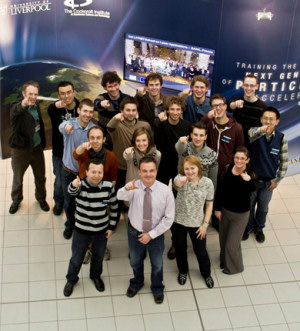The gaining of complementary skills is one of the aims of the European Higher Education Area as it promotes training to ensure that all graduates have the skills necessary to enter the global job market. The Marie Curie Initial Training Network LA³NET, coordinated by Prof. Carsten P. Welschfrom the Cockcroft Institute/University of Liverpool, aims to improve the employability of its fellows by providing both subject-specific and generic training from a variety of academic and industry trainers. For this purpose a week-long School was now held in Liverpool between March 18th-22nd 2013.
The School was hosted at the University of Liverpool’s Foresight Centre and included sessions on presentation techniques, project management and scientific writing that all focused on the fellows’ individual research projects. In addition, all concepts taught during the week had to be applied by the participants to compose an application for a novel outreach project. Sessions on researcher careers planning and international collaboration complemented the broad program. Trainers included experts from Fistral and Lissajous Nucleonics Ltd, academics from the Universities of Liverpool (Dr. David Joss, Prof. Peter Butler) and Lancaster (Dr. Rosa Letizia), as well as members of the EU Project Team (Helen Williams and Dr. Rob Ashworth).
On Wednesday all fellows visited Sci-Tech Daresbury for a presentation about the Cockcroft Institute by Prof. Swapan Chattopadhyay, followed by a tour of the laboratories, the accelerator facilities and the Electron Beam Test Facility (EBTF) under construction at the Daresbury site, provided by ASTeC. The visit also gave the participants the opportunity to see the Cockcroft Institute’s new EU-themed atrium.
The School was considered extremely helpful by all participants and gave ample opportunities for networking. The training concept will be presented in form of two oral contributions to the Higher Education Academy’s Learning and Teaching conference in Birmingham next month.
The LA³NET project is funded by the European Union under Grant Agreement Number 289191.

Marie Curie International Training Networks aim to improve career perspectives of early-stage researchers in both public and private sectors, thereby making research careers more attractive to young people. This will be achieved through a trans-national networking mechanism, aimed at structuring the existing high quality initial research training capacity throughout Member States and associated countries. In particular, they aim to add to the employability of the recruited researchers through exposure to both academia and enterprise, thus extending the traditional academic research training setting and eliminating cultural and other barriers to mobility. Grants are awarded through a highly competitive process.

